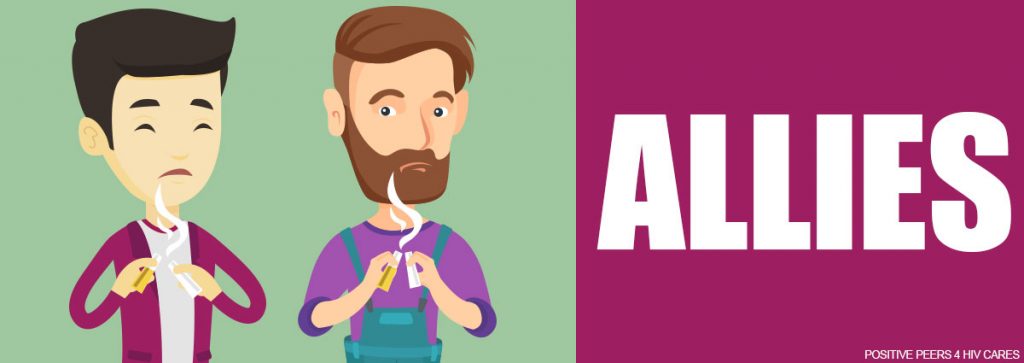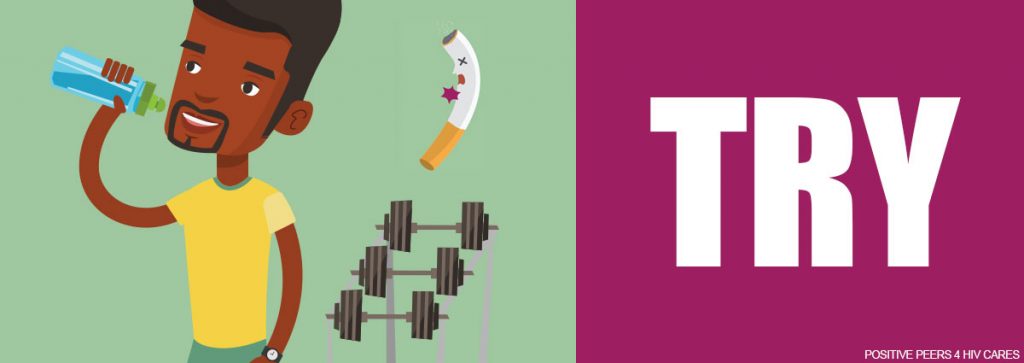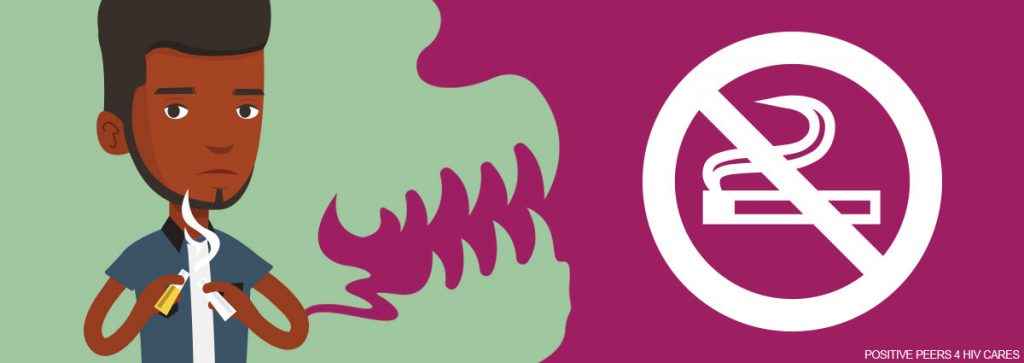
By: Ann K. Avery, MD, Infectious Disease Physician at MetroHealth Medical Center
The scientists who study HIV say quitting smoking is one of the best things you can do for your health besides taking your meds every day.
Easy for them to say. They’re not the ones with the drive-you-crazy cravings. They don’t have a bae and nine close friends who smoke. They can’t appreciate the comfort of a fresh breath of nicotine in the lungs.
If you smoke, you live these realities every day. You know smoking isn’t good for you. And it’s no good for all the people you smoke around.
Hell, you probably want to quit. Pretty much everybody does.
But why does smoking have to be so damned hard to kick?
Well, nicotine is an incredibly addictive drug. Once it gets into your bloodstream, your body becomes hooked. It’s a lot like heroin, cocaine, or alcohol — except you can smoke cigarettes and still keep your head on straight.
When you stop smoking, your body starts sending signals demanding more nicotine. The cravings go away only when more nicotine arrives.
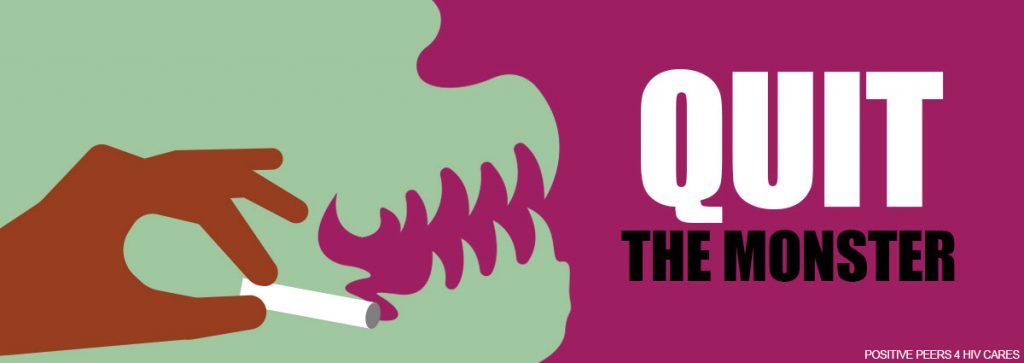
Getting started with quitting smoking
The experts on quitting smoking agree on one thing: You have to make up your mind it’s time to quit. Think of it as a commitment, like the one you made when you realized HIV is a big deal and you have to do something about it.
A mental exercise might help: Imagine your addiction is a little monster inside you that doesn’t care about anything but getting more nicotine. It doesn’t care about you. It doesn’t care about the people you love. It just wants you to keep smoking no matter what.
Maybe getting your mind into a place that says, “It’s either me or the monster, and I’m not letting the monster win,” might help. Some folks who kick smoking for good create a mind trick that gives them a rock-hard determination to never give in.
That’s willpower, baby, but willpower alone isn’t always enough.
For many people, it helps to have a strategy, tactics, and allies.
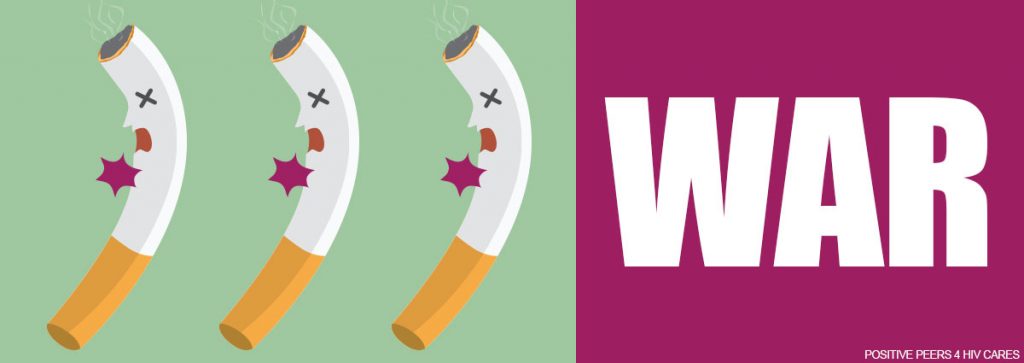
Your own little war on smoking
If you’re a general sending your army to war, you start with strategy — a big broad plan of attack. You use tactics to achieve your strategy. And you bring in allies because you’ll win this war a lot quicker with help.
So, your stop-smoking strategy should start with a goal, like quitting smoking for nine months.
Why not say, “quit smoking for good?” Because that’s too much pressure. It’s like standing at the bottom of Mount Everest and thinking you have to climb the whole thing this afternoon.
Besides, once you’ve quit for nine months, you’ll be thinking, “No way am I throwing it all away after all the crap I put up with to get this far.”
Come join our private, stigma-free, supportive community.
Health management tools with medication & appointment reminders.
Social networking in a community conversation & private chats.
Tactics for quitting smoking
This part calls for a checklist:
- Pick a day to quit. Some people like to cut their smoking down by a few cigarettes a day until they are down to one or two. That’s fine if it works for you, but you have to pick your cutoff date.
- Get moral support. Tell your friends you plan to quit and ask them to stop smoking around you after the day comes.
- Get something to hold in your fingers. When you feel like smoking, grab something else like a pencil or anything that’ll take your mind off smoking but replace the physical sensation of holding that cig in between your fingers.
- Chew gum or suck on candy. Your mouth also expects something besides food and drink. Chewing gum and hard candy often help. Lolipops can work wonders!
- Avoid triggers. Some things make you want to smoke, like your first cup of coffee in the morning. Change up your routine so it’s really inconvenient to smoke — like drinking your coffee in a place where smoking is prohibited.
- Avoid other smokers. Smelling other people’s cigarettes will send your cravings into hyperdrive. At least for the first few weeks or months, try to control your exposure to other smokers.
- Lay off on drinking alcohol. This is another brutally tough tactic because smoking and drinking go together so well. Remember, drinking lowers your inhibitions and makes it easier to give in and try just one smoke.
- Remember the little monster. The cravings will start whispering in your ear. Remember, that’s not you, it’s the addiction demanding a hit. Reminding yourself you’re at war with the monster might get you through the nasty cravings.
Getting some allies in your war on smoking
There are two kinds of allies that can help you out: personal and chemical.
Personal allies are people you can turn to for moral support and encouragement. When the cravings are hitting you hard, call a friend and ask them to talk you through it. Or call Nicotine Anonymous toll-free at (877) 879-6422 or visit nicotine-anonymous.org.
Your local HIV clinic also can help you find support groups and resources.
Chemical allies are medications that help you quit. They include:
- Nicotine replacement therapy: Nicotine patches, nasal sprays, and other therapies keep some nicotine in your bloodstream but save you from all the nasty chemicals in cigarette smoke. These help you overcome the cravings while you develop new habits.
- Anti-craving medicines: Zyban and Chantix are two drugs designed to decrease your craving for nicotine. Be sure to consult with your doctor carefully before getting a prescription: Some people can have strange side effects.
What about electronic cigs?
Some people may think about switching to electronic cigs or vaping instead of normal cigarettes. While these may be advertised as a safer solution to lighting up, there are some risks they have also, including exploding batteries, a continued dependence on nicotine, and other toxic chemicals. The most important take-away here is that e-cigarettes have not been approved by the FDA as a safe or effective method to help smokers quit.
There’s no such thing as failure when you’re trying to quit smoking
You might quit for a few weeks, then go back. And then you might quit for a few months, and go back. And finally, you might quit for a year, relapse for a month, and then quit for good.
Giving up cigarettes is one of the hardest things you’ll ever do. But once you quit for good, you’ll be confident that you can overcome difficult tasks. That’ll make you stronger and healthier.
There’s nothing like being able to say, “I fought nicotine and won.”
More on HIV and smoking at:
Related Blogs:

